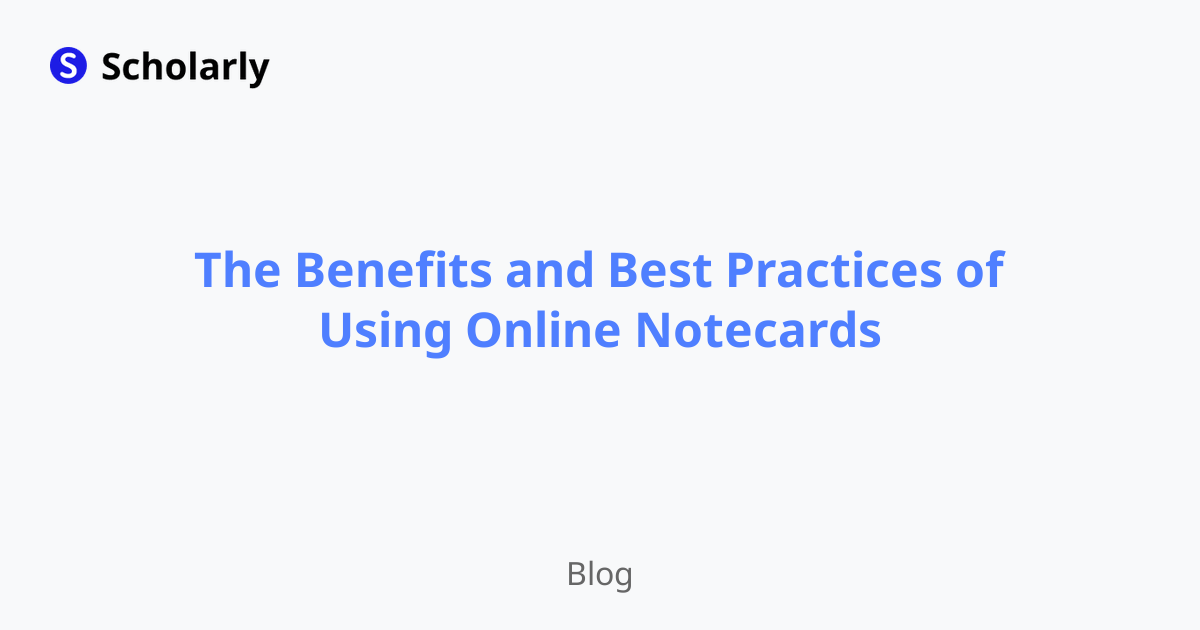The Benefits and Best Practices of Using Online Notecards
Discover the benefits and best practices of using online notecards for effective studying and knowledge retention.

Introduction
Welcome to the digital age of studying! In this article, we will explore the benefits and best practices of using online notecards. Whether you're a student preparing for an exam or a professional seeking to retain information, online notecards offer a convenient and effective way to study and improve knowledge retention.
Benefits
Enhanced Organization: Online notecards allow you to create, store, and organize your study materials in one place. You can categorize notecards by subject, topic, or any other relevant criteria, ensuring easy access to specific information when needed.
Accessibility: Unlike physical notecards, online notecards are accessible anytime, anywhere, as long as you have an internet connection. This flexibility allows you to study on-the-go or during downtime, maximizing your study time and efficiency.
Interactivity: Many online notecard platforms offer interactive features such as flashcards, quizzes, and spaced repetition. These features engage your active learning skills and reinforce knowledge through repetitive practice, leading to improved information retention.
Collaboration: Online notecard platforms often provide collaborative features, allowing you to share and collaborate on notecards with classmates, colleagues, or study groups. This collaborative studying approach promotes knowledge sharing, discussion, and deeper comprehension of the material.
Eco-Friendly: By opting for online notecards, you contribute to a more sustainable environment by reducing paper waste. Going digital aligns with the eco-conscious mindset and helps preserve our planet.
Best Practices
To make the most of online notecards, consider the following best practices:
Keep Notecards Concise: Write clear and concise statements on each notecard to focus on the key points. Avoid lengthy explanations, as the goal is to create bite-sized information that is easy to review and remember.
Use Visuals: Incorporate relevant visuals, such as diagrams or charts, to enhance your understanding and memory retention. Visual aids can make complex concepts more digestible and memorable.
Utilize Spaced Repetition: Take advantage of the spaced repetition feature offered by online notecard platforms. This technique ensures that you review notecards at specific intervals, optimizing long-term retention and reducing the risk of forgetting information.
Mix Up Card Order: Shuffle the order of your online notecards to avoid relying on the context of neighboring cards. Randomizing the order challenges your memory and helps you truly grasp the content rather than memorizing a specific sequence.
Regular Review: Set aside dedicated time for regular review of your online notecards. Consistency is key when it comes to retaining information. A regular review schedule ensures that the knowledge stays fresh and easily accessible in your memory.
Pros and Cons
Pros of Using Online Notecards
- Convenience: Online notecards are accessible anytime, anywhere, using various devices.
- Interactive Features: Many online notecard platforms offer interactive features like quizzes and games, making studying engaging and fun.
- Efficient Organization: Create and manage notecards in a structured and organized manner, improving study efficiency.
- Collaboration: Collaborate with peers or classmates on shared notecards, fostering a collaborative learning environment.
- Eco-Friendly: Choose a paperless studying solution and contribute to environmental sustainability.
Cons of Using Online Notecards
- Internet Dependency: Online notecards require an internet connection, which may limit accessibility in certain situations.
- Distraction Potential: Online platforms can be prone to distractions, reducing focus and study effectiveness.
- Technical Issues: Like any digital tool, technical issues or platform downtime may occur, hindering study progress.
- Learning Style Compatibility: Online notecards may not be suitable for all learning styles, as some individuals prefer tactile learning or physical notecards.
- Cost: While many online notecard platforms offer free features, advanced functionalities may require a subscription or purchase.
Comparison
When it comes to online notecard platforms, several options are available. Here are a few popular ones:
- Anki: Anki is a widely-used and highly customizable online notecard platform. It offers features like spaced repetition and multimedia support.
- Quizlet: Quizlet provides a user-friendly interface and a large database of user-generated notecards. It offers various study modes and collaborative features.
- Scholarly: Scholarly is an AI-powered online notecard platform that leverages machine learning to generate flashcards from text and helps users study effectively with AI-powered tutoring.
Conclusion
In conclusion, online notecards bring numerous benefits to the studying experience. Their enhanced organization, accessibility, interactivity, and collaborative features make them a valuable tool for learners of all levels. By following the best practices and considering the pros and cons, you can optimize your online notecard usage and improve your studying efficiency. Whether you choose Anki, Quizlet, or Scholarly, harness the power of online notecards to elevate your learning journey and achieve academic and professional success.
Try Our Popular AI Study Tools
Transform your study materials into interactive learning experiences with our most popular AI-powered tools:
PDF to Flashcards
Convert lecture notes and textbooks into study flashcards instantly
Text to Flashcards
Turn any text or notes into comprehensive flashcard sets
Image to Flashcards
Convert diagrams and handwritten notes into digital flashcards
YouTube to Flashcards
Generate flashcards from educational video content



